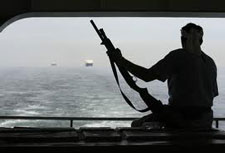Maritime Security in the Gulf of Guinea
Source: Gemini Maritime (appears in Lloyd's List)
It seems so long ago that Lynn Pascoe, the outgoing under-secretary-general for political affairs in the United Nations, told a meeting of the Security Council last February, “We must take further concrete steps designed to eradicate piracy in the Gulf of Guinea, which constitutes a clear threat to the security and economic development of the states in the region.”
As the UN prepares for another security summit later this year to try and draw together a comprehensive strategy amongst the 15-member Economic Community of West African States (ECOWAS), the lack of any maritime security strategy is having a significant effect across the region where maritime criminal activity is on the rise.
Current reports detail the attacks being extremely violent, with pernicious beatings accompanying robbery, kidnap and even death. According to the International Maritime Bureau (IMB), in 2011 there were a total of 25 incidents. Up to 5 September 2012, there have been 40 reported attacks on vessels in the Gulf of Guinea, with 19 vessels boarded and eight successfully hijacked. Concern is mounting for the safe passage of vessel, cargo and crew through this high-risk area. All this against a backdrop of other forms of transnational organised crime in the Gulf, including oil bunkering, robbery at sea, hostage taking, human and drug trafficking and terrorism.
|

|
|
Gulf of Guinea presents a different
kind of threat to PMSCs
|
With so many contributory factors affecting the maritime criminal activity in the Gulf, its origins lie onshore where poverty, unemployment, corruption and free access to weapons give cause to launch attacks on commercial vessels offshore. As witnessed in the Indian Ocean, it is a supreme challenge to gain consensus between affected nations towards a comprehensive approach in maintaining safe sea-lanes. But it can be done, as proved in the Malacca straits, where agreement was reached between Indonesia, Malaysia and Singapore to adopt common maritime security initiatives, which heralded a decline in Piracy activity in the area. By contrast, off the Horn of Africa, consensus is building between nations as countries affected by piracy take these criminals to task. International Navies have also made a difference, but they can’t be everywhere and in an area the size of the Indian Ocean, it is worthy of note that the private sector has risen to the challenge of maintaining maritime security where the public sector simply has not fulfilled. In the words of the Chief of Staff to the EUNAVFOR earlier this year: “the private sector is part of the solution, not the problem.”
With little sight of a common maritime security policy being adopted in the Gulf, how can the private sector provide an effective piracy deterrent? The counter piracy model used by the majority of PMSC’s in the Indian Ocean does not supplant easily into the Gulf of Guinea. The greatest challenge for any private security lies in the inability of a private maritime security company to provide an armed deterrent inside territorial waters. For now Government Security Forces (GSF) provides the armed deterrent, sometimes guided by unarmed private maritime security advisors. Local private security companies are in use, such as in Nigeria, where the state contracted PMSC ‘Global West Vessel Specialist Ltd’ is supporting the Nigerian Navy. But the varying degree of effectiveness to operate is questionable with the head of Global West recently killed in a clash with Pirates and the GSF also suffering loss of life in engaging with the pirates. This does little to mitigate the threat to vessel and crew transiting the area. Counter this with the admirable record of private maritime security in the Indian Ocean where not a single vessel has been lost to hijack where armed security teams are embarked.
Understandably, ship-owners are concerned and many PMSC’s are receiving requests to provide risk management solutions for the areas they must transit. Whilst Gemini continues to service its clients through the HRA off the Horn of Africa, we are responding to an increasing number of requests for assistance in the Gulf, but there are obvious challenges. Of the ten nations in the region, there are a myriad of state organisations, military, civil and governmental charged with the maritime security of their territorial waters. There is little consensus and for the ship owner trying to meet his clients’ needs of transporting goods, the vulnerability and likelihood of attacks are high. Where some states have had positive effects in deterring attacks in the outer port limits and anchorages, the problem has been shifted further offshore where vessels are often caught out believing that 135NM offshore is ‘safe’; quite the contrary. Liaison at every level is key to the successful implementation of risk management solutions in the region. Across such a vast geographical area involving so many nations, this is a supreme challenge for any private organisation, but Gemini is engaged and fully committed to servicing its clients in providing safe passage for cargo, vessel, master and crew.
As in the HOA, the private sector is beginning to fill the void in delivering maritime security to the Gulf of Guinea. Ship-owners are understandably anxious at the financial and human cost, their crews far more so, where the “smash and grab” robbery is extremely traumatic. The lack of an agreed maritime security strategy between the Gulf States continues to hamper efforts to stem the increase in maritime criminal activity and the region seems set to degenerate into greater instability. However with greater engagement of the private sector, this downward spiral could be halted.
Alain Schembri is the Managing Director of Gemini Maritime Ltd
Gemini Maritime Ltd is a UK Maritime Security company providing risk mitigation solutions to an international portfolio of clients. Built on a foundation of British Naval experience, Gemini delivers a professional, reliable and ethical service, operating within international regulations. Offering the highest level of services to clients ranging from security auditing, training, maritime intelligence, project management and physical protection, Gemini Maritime Ltd is staffed by former British Naval Warfare specialists along with international commercial experts in the maritime sector.
www.geminimaritime.com
 Subscribe to our newsletter. Receive a weekly round-up of all piracy-related news.
Subscribe to our newsletter. Receive a weekly round-up of all piracy-related news.
OCEANUSLive.org
Information, Security, Safety; Shared
Submitted by Team@oceanuslive.org